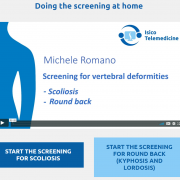Scoliosis: learning to love yourself and overcome your fears
Many of our patients receive their scoliosis diagnosis in the midst of what is one of the most intense and turbulent periods in a person’s life, characterised by sudden and profound transformations that can even lead them to question and redefine their very identity. We are talking about adolescence.
During adolescence, the body changes, even quite abruptly, and these changes do not always give us the body we would like to have.
At the same time the sexual organs and secondary sexual characteristics are developing too, leading us to discover a new, previously unexplored, dimension of our body.
Cognitive development continues and sometimes peaks in adolescence. In other words, our cognitive functions gradually reach full maturity, albeit not all at the same rate. In fact, the different areas of our brain have different developmental trajectories and mature at different times. The frontal lobes are a particularly interesting area in this regard, as they constitute the neural substrate of what are termed executive functions, i.e., complex cognitive abilities such as the ability to plan, organise and regulate our behaviours.
Adolescence is also the period of life in which we experience an increasing range and intensity of emotions, but may struggle to regulate them if the brain area involved has not yet reached full maturity.
“Finally, our social relations are also an area of life that changes in adolescence,” explains ISICO psychologist Dr Irene Ferrario. “This is, of course, the period when friendships become increasingly meaningful and important to us, and in which, in some cases, we form our first romantic attachments. In short, it is a time when the demands placed on us by our social environment are becoming ever more complex.”
While all this is going on, some young girls and boys also find themselves having to handle and “digest” a diagnosis of scoliosis and the need to wear a brace, something that some patients find harder to do than others.
“One of the most common reactions in those struggling to accept their scoliosis and its consequences is anger towards a condition that, they feel, limits their freedom, that they perceive as unfair, and that makes them feel embarrassed, given that the brace can be seen under their clothes or felt when others hug them,” Dr Ferrario goes on.
Fear of what others might say or think is something we can experience at any age, although it is particularly frequent and acute in adolescence when we desperately desire to feel accepted by our peers, and to be like them. For some people, though, this fear can be paralysing, leading them to avoid all situations in which they might be exposed to the judgements of others. As a result, they limit their experiences, leading to even greater feelings of isolation and loneliness.
Sometimes it can be enough to talk these feelings over with friends or parents, or it may be sufficient, with the help of the doctor or physiotherapist, to find ways to manage the brace better.
Other times, patients can find it useful to talk with a psychologist about their feelings and the suffering a certain situation is causing them. Scoliosis treatment is a long and arduous process and it is quite normal to experience moments of difficulty due to tiredness or linked to changes in the patient’s life. Changing schools, changing friends, starting new relationships, arguments at home — all these are situations that can become moments of crisis that in turn impact the management of the treatment.
“The word crisis has negative connotations, but in actual fact this word came into being with a very different meaning” Dr Ferrario remarks. “It comes from a Greek word meaning choice or decision. In this light, a moment of crisis can be seen as an opportunity to make a choice that there is no escaping, whether you like it or not — an opportunity to redefine some aspects of yourself. Asking for help in a crisis is not a weakness. On the contrary, it takes courage to question yourself and decide to ask for help!”
At ISICO, it is sometimes families that ask to see the psychologist, and sometimes the doctors or physiotherapists suggest it, if they realise that a youngster is struggling, whether or not it is because of the treatment.
The intervention, at this point, may range from simple identification of the factors underlying the patient’s non-compliance to the structuring of a personalised support or psychotherapeutic pathway based on the youngster’s specific needs. The psychologist can also support doctors and therapists by helping them to understand and manage complex situations.
This collaboration between mental health professionals, doctors and physiotherapists allows us to take care of the whole person and not just their back.











Leave a Reply
Want to join the discussion?Feel free to contribute!